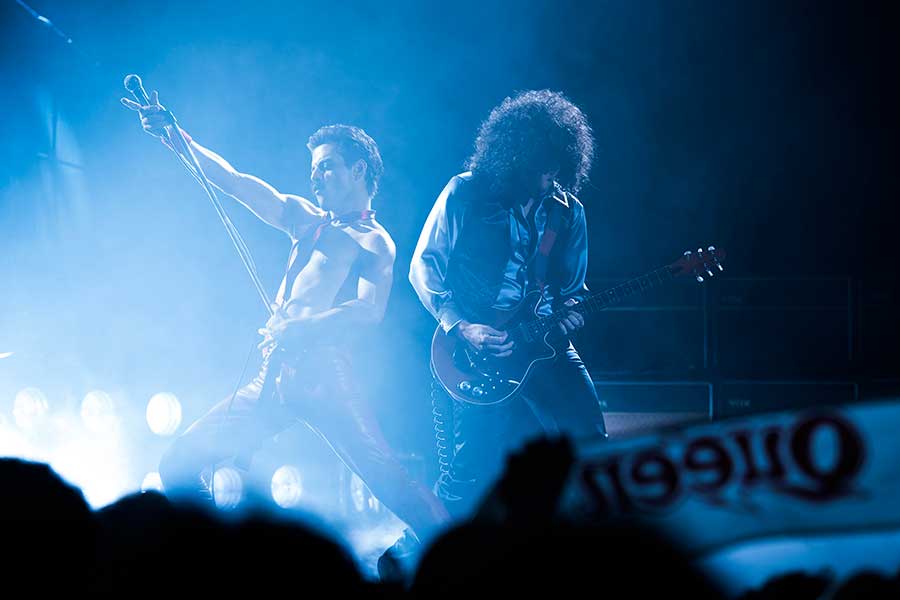“Bohemian Rhapsody” had a troubled production even before queer director Bryan Singer was fired for sexual misconduct.
Singer reportedly had “creative differences” with actor Rami Malek, who plays Queen frontman Freddie Mercury.
Nevertheless, the highly anticipated film doesn’t disappoint as an entertaining jukebox musical biopic. The resulting production glosses over elements of Mercury’s life and lends some superficiality. The soundtrack includes the band’s hits, from “Killer Queen” to “Another One Bites the Dust.” The performance of “Will We Rock You,” is goosebump-inducing.
Part of the film’s success is Malek’s gutsy performance. Although the actor never quite disappears into the role of Mercury, he acts just flamboyant enough, peppering his speech with “darlings,” strutting on and off stage and wearing outrageous outfits. (The film’s costumes comprise the most fabulous glam-rock couture since “Velvet Goldmine.”)
Malek does capture the palpable loneliness of Mercury, who doesn’t quite know how to fit in, so he stands out. This strategy also works for his bandmates: When they describe themselves as “misfits playing to outcasts,” it makes perfect sense.
The film follows a conventional narrative. It opens with the band preparing to take the stage at London’s Live Aid concert in 1985 at Wembley Stadium, then flashes back to 1970, when Farrokh Bulsara — the Zanzibar-born Mercury’s real name — meets Roger Taylor (Ben Hardy) and Brian May (Gwilym Lee) after seeing them in concert. The singer impresses them with his four-octave range, thanks to extra incisors he was born with (hence his distinctive teeth). He also meets Mary (Lucy Boynton), who helps him with his fashion sense. He falls in love with her and they later marry, maintaining a strong bond throughout his career.
“Bohemian Rhapsody” excels during its concert scenes, in which the renamed Freddie Mercury has the audience (and moviegoers) eating out of the palm of his hand. His presence is exotic and exciting and his vocals are amazing. The film shows the brilliance of Mercury’s songwriting and producing skills, as well as the band’s insistence on daring to be different.
When Queen meets with Ray Foster (Mike Myers, unrecognizable here), an EMI record executive, the band members explain their plans for their next album, and demand the six-minute-long operatic “Bohemian Rhapsody” be their next single. These scenes crackle with attitude and wit. The band resists “formula” but, ever the businessman, Foster insists on formula. The band, of course, wins.
Viewers may wish “Bohemian Rhapsody” were less formulaic. Singer’s film — although he is officially credited as director, Dexter Fletcher stepped in to finish the project — is best when it focuses on the music, but sketchy when it depicts Mercury’s queer life. There’s a hint at Mercury’s sexuality when he is attracted to a trucker he sees entering a men’s room. And when his manager, Paul Prenter (Allen Leech), plants a kiss on him, Mercury protests. But later, when Mercury makes a pass at Jim Hutton (Aaron McCusker), a waiter at a party, Hutton tells him he must first love himself in order to love someone else.
Much of the film’s personal drama involves Mercury figuring out whom he is, who he loves and who loves him. Yet, while the film examines his relationship with his biological family and his “family” that is Queen, his queer sex life is downplayed. This may be because of the PG-13 rating; and the sex and drugs also were restricted in favor of the rock ’n’ roll. But it also feels like a missed opportunity to explore an essential part of the performer’s life.
When the story reaches 1980 and Mercury grows his famous mustache, “Bohemian Rhapsody” really starts to falter. His efforts to go solo are dragged out and drag down the narrative. There is even a trite scene of Mercury standing in the rain making an important life choice. An awkward press conference, where he is questioned about his sexuality, is filmed in a garish, distracting style. His AIDS diagnosis features a strange scene in a gloomy hallway where another patient acknowledges his musical hero by singing “Ay-Oh.” The point, that Mercury had an impact on a queer fan, oddly rings hollow.
The film seems to be ticking off important life moments, but these scenes fail to generate much emotion. Even the dramatic tension of Mercury having trouble with his voice leading up to his Live Aid performance — which may be true — feels contrived.
However, these drawbacks will be forgotten once Mercury takes the stage at Wembley and delivers an electrifying performance. “Bohemian Rhapsody” redeems itself by letting the music speak volumes. And Malek’s show-stopping concert performance makes the film sing. n

